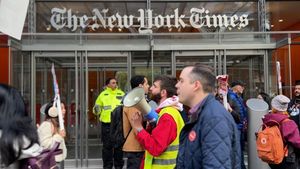Rapper Young Thug, born Jeffery Williams, recently faced the court's judgment and has been released from jail after pleading guilty to several crimes linked to gang activity, drugs, and firearms. The decision came following two and half years of legal battles and delays, marking the conclusion of one of Georgia's longest-running criminal trials.
On Thursday, October 31, during the sentencing at Fulton County Superior Court, Judge Paige Reese Whitaker accepted Young Thug's non-negotiated guilty plea. This plea meant no deal was worked out with prosecutors, leaving his fate entirely up to the judge, who imposed significant terms for his release. Williams was found guilty of one gang charge, three charges relating to drug offenses, and two gun charges. He also entered no contest to another gang charge and conspiracy to violate Georgia's Racketeer Influenced and Corrupt Organizations (RICO) Act.
The plea happened amid tumultuous court proceedings spanning nearly four years, filled with continual delays and hurdles. The selection of jurors began back in January 2023 and took nearly 10 months, during which time numerous witnesses were called as part of the complex trial. One particularly significant delay occurred when the original judge was removed for inappropriate interactions with the prosecution.
Judge Whitaker's sentence totaled 40 years, but the conditions had been considerably modified. The first five years were commuted to time served, leading to 15 years of probation for the rapper. If Williams adheres to the terms of his probation without violations, he may see another 20 years eliminated, but failure to comply would bring those years back, potentially adding onto penalties for any infractions.
Among the strict conditions of his release, Young Thug must avoid the metro Atlanta area for the first decade of his probation, except for specific occasions such as weddings, funerals, or serious family illnesses. Nonetheless, he is required to return to the area four times each year during his probation for community outreach, delivering anti-gang and anti-gun violence messages to children. This requirement aligns with the 100 hours of community service mandated annually.
Other restrictions include the prohibition against associational contacts with gang members or identified victims and defendants from the case, with few exceptions involving his brother and fellow rapper Gunna, to whom he has contractual ties. Young Thug cannot promote any gang activities, nor can he engage with signs or lingo associated with gangs. He will also submit to random drug tests and must refrain from gun possession yet is allowed travel for work.
The courtroom broke ground earlier this week as three of his co-defendants also struck deals with prosecutors, leading to terms of imprisonment alongside the dropping of other charges. With more than two dozen people implicated, including Young Thug, this trial has thrust significant attention onto the gang undercurrents linked to the music industry.
The mountain of evidence against Young Thug included various lyrics from his songs, cited by the prosecutor to assert his connection to violent gang culture, which his defense attorney, Brian Steel, challenged vehemently. Steel argued the state utilized the artist's lyrical content offensively against him and characterized the evidence as flimsy, maintaining Young Thug was wrongfully accused. During the court session, Young Thug expressed his wish to amend his past actions and described his upbringing and subsequent rise to fame.
"I’ve learned from my mistakes, you know. I come from nothing and I’ve made something and I didn’t take full advantage of it. I’m sorry," Young Thug stated, reflecting on his experience.
Judging by the words of Judge Whitaker, she appreciated Williams’ acknowledgement of his influence and potential to inspire positive actions among youths who might see themselves mirrored in his music and lifestyle choices. She urged him to pivot toward being part of the solution rather than perpetuating problems, prompting hope for future community impact through his mandated outreach presentations.
Young Thug's high-profile case has illustrated the intersection of artistry and the legal system, as prosecutors and defense teams navigate the blurred lines between musical expression and real-life consequences. The complexity of his case and trial procedures highlights concerns among artists about their creative freedoms amid law enforcement scrutiny. His release on probation inevitably sparks varied discussions across music and legal platforms, reflecting on the challenges artists can face within the judicial system.
While Young Thug is now out of jail, the fate of two other co-defendants remains pending as they choose to proceed with trial, signaling the prolonged saga of criminal investigations tied to the YSL label. The situation continues to evolve, and the influence of Young Thug is poised to resonate as he re-engages with his craft and community.
This chapter may have closed for the rapper, but it has opened broader dialogues around personal responsibility and the repercussions of lifestyle choices tied to popularity within the music industry, particularly within hip-hop culture.



